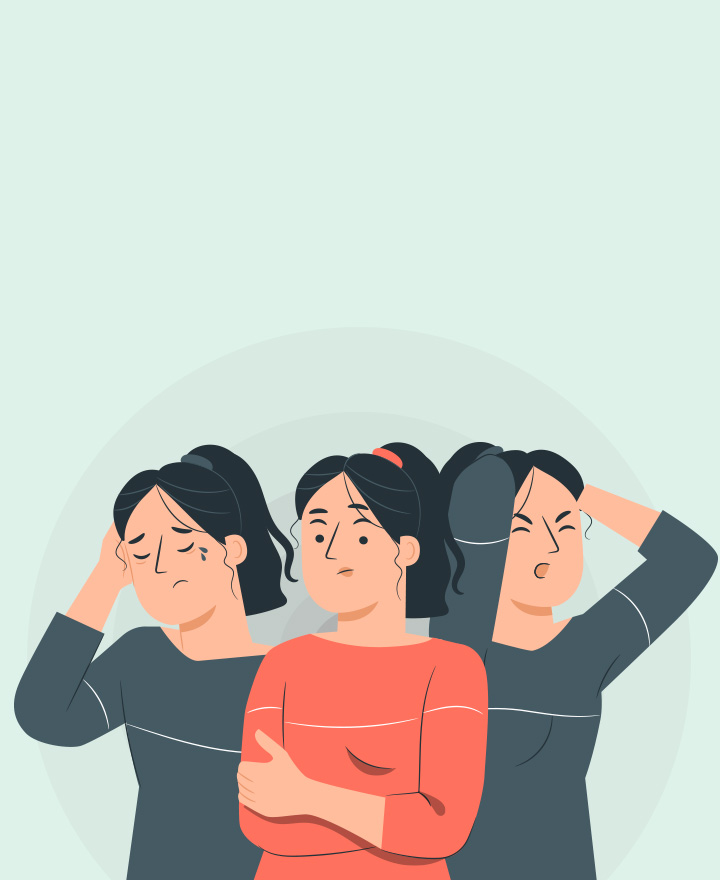

Bipolar Disorder: Types, Symptoms & Treatment
Bipolar disorder or manic depression is a serious mental disorder that causes extreme and intense shifts in mood and behaviour. While there is no cure for the condition, there are treatment options available which can help to improve the quality of life.
Types of Bipolar Disorder
1. Bipolar I disorder- this involves periods of severe mood episodes from mania to depression
2. Bipolar II disorder- this is a milder form of mood elevation, involving milder episodes of hypomania that alternate with periods of severe depression.
3. Cyclothymic disorder- this involves brief periods of hypomanic symptoms alternating with brief periods of depressive symptoms. These symptoms are not as long-lasting or as extensive as seen in full hypomanic or depressive episodes.
Bipolar Disorder Symptoms
As per the international bipolar association, Bipolar disorder symptoms vary between individuals and also differ during the manic and depressive phase.
1. The manic phase is characterized by:
• Extreme happiness, hopefulness, and excitement
• Irritability, anger, fits of rage, and hostile behaviour
• Restlessness
• Agitation
• Rapid speech
• Unusual high sex drive
• Increased energy
• Less need of sleep
• Poor concentration & judgment
• Paranoia
• Setting unrealistic goals
Before Mania, a milder group of symptoms may appear, known as hypomania in which the symptoms are similar to mania but are in a milder form.
2. The depressive phase may include:
• Sadness and crying
• Feeling of hopelessness, worthlessness, and guilt
• Loss of energy
• Loss of interest or pleasure in routine activities
• Trouble concentrating & making decisions
• Irritability
• Need for sleep
• Change in appetite resulting in weight loss/ gain
• Suicidal thoughts
Treatment of Bipolar Disorder
The treatment involves a combination of therapies such as:
1. Medication aims to stabilize the mood and minimize the extremes. Drugs usually prescribed are anti-depressants, mood stabilizers, anti-convulsants, and sleep medications. As medicines may cause serious side-effects, they should be taken under as directed by healthcare professional.
2. Lifestyle modifications such as following a healthy and balanced diet, a quality sleep pattern, regular physical activity, meditation, and maintaining a mood chart can help to stabilize mood and manage symptoms efficiently.
3. Psychotherapy and counseling helps in educating an individual about his condition and makes him aware about the expected outcomes of bipolar disorder symptoms.
4. Cognitive behaviour therapy (CBT)helps a person deal with bipolar disorder symptoms by helping them recognize & manage triggers, identify early symptoms & how to manage them, and maintain a stable mood for long period.
5. Other treatment strategies are:
• Electroconvulsive therapy (ECT) - this is usually given in severe cases where mild electrical current is passed to the brain to alter its chemistry & functioning.
• Transcranial magnetic resolution (TMR) - this therapy is also used in severe cases wherein a short electromagnetic coil is used to pass controlled wave of electric current to the brain.
• Ketamine treatment – in this, an anaesthetic agent called ketamine, is given through IV to patients with worst bipolar disorder symptoms like depression and suicidal thoughts.
• Thyroid medications - These act as a supportive treatment and help stabilize mood swings. They are used in rapid cycling bipolar disorder.
• Hospitalization may be required as emergency care in cases where a patient turns violent or undergoes a severely ill state.
Conclusion
Bipolar disorder is a serious mental illness characterized by extreme mood swings. While there is no cure for this, seeking professional help can help treat this disorder along with psychotherapy, counseling, lifestyle changes and family support.
Disclaimer: This blog provides general information and discussions about health and related subjects. The information and other content provided in this blog, website or in any linked materials are not intended and should not be considered, or used as a substitute for, medical advice, diagnosis or treatment. Kindly contact your Doctor before starting a new medicine or health regime.
Related Articles
How Social Media Affects Your Mental Health And Leads To Anxiety
What Is The Connection Between Heart Health And Stress?
5 Yoga Asanas To Help You Increase Your Concentration
Published on September 07, 2022

















 Health Insurance
Health Insurance  Travel Insurance
Travel Insurance  Car Insurance
Car Insurance  Cyber Insurance
Cyber Insurance  Critical Illness Insurance
Critical Illness Insurance
 Pet Insurance
Pet Insurance
 Bike/Two Wheeler Insurance
Bike/Two Wheeler Insurance  Home Insurance
Home Insurance  Third Party Vehicle Ins.
Third Party Vehicle Ins.  Tractor Insurance
Tractor Insurance  Goods Carrying Vehicle Ins.
Goods Carrying Vehicle Ins.  Passenger Carrying Vehicle Ins.
Passenger Carrying Vehicle Ins.  Compulsory Personal Accident Insurance
Compulsory Personal Accident Insurance  Travel Insurance
Travel Insurance  Rural
Rural